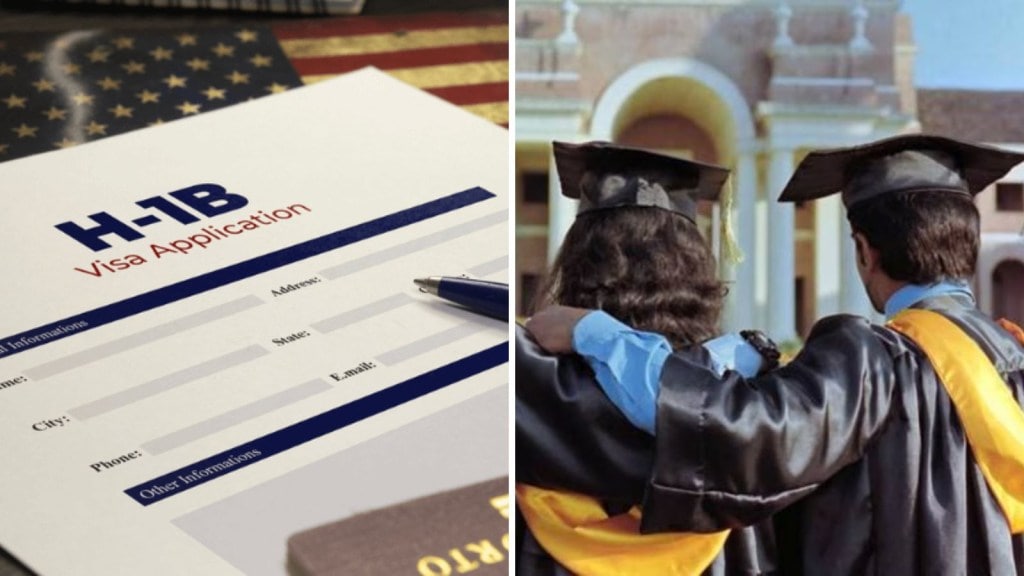A large number of international students in the US are running into the same painful line during their job hunt: “No international candidates.” Ever since Trump imposed the hefty $100 K fee on the new H-1B visa holders, recruiters across industries, especially in tech and biotech, have become hesitant to sponsor work visas, leaving many international students unsure of their future in the country, Bloomberg reported.
The White House argued the move would “put America First,” reduce system abuse and protect citizen workers. But business groups say it has created chaos in industries that rely heavily on global talent.
H-1B sponsorship offers are drying up
According to Handshake, a student career platform cited by Bloomberg, the percentage of full-time job postings offering visa sponsorship has dropped sharply — from 10.9% in 2023 to 1.9% in 2025. The tech industry saw the biggest drop, falling to one-third of last year’s level. Even Walmart, America’s largest private employer, recently paused job offers for candidates needing H-1B visas.
The timing couldn’t be worse, as the white-collar job market has also slowed. Tech hiring is down, and entry-level jobs have shrunk as companies replace junior roles with AI tools. Unemployment among recent graduates (ages 22 to 27) hit 5.8% in April, the highest since 2021.
University career centres say companies are simply playing safe. Employers don’t want the uncertainty of sponsorship delays or rule changes. Some recruiters told Yale University they avoid hiring international students because the nine-month lag between job offer and start date makes the process even riskier.
In 2024, more than 70% of visas went to Indian workers. Top 10 Countries (2024):
- India: 283,397
- China: 46,680
- Philippines: 5,248
- Canada: 4,222
- South Korea: 3,983
- Mexico: 3,333
- Taiwan: 3,099
- Pakistan: 3,052
- Brazil: 2,638
- Nigeria: 2,273
According to the Bloomberg report, international students now apply to far more jobs than before because sponsorship uncertainty shuts many doors immediately. The imbalance between job supply and demand has made the stress even worse.
The US Chamber of Commerce has already sued the Trump administration, calling the rule illegal and warning that it could damage hiring pipelines across tech, research and consulting. Companies such as Amazon, Microsoft and Meta, among the largest users of the H-1B program, could be hit the hardest.
While the White House later clarified that recent foreign graduates and certain student visa holders would be exempt from the fee, confusion around implementation has made employers cautious. Even major recruiters say they are unsure about long-term costs and paperwork.
American dreams running into roadblocks
Nearly 1.1 million international students are currently enrolled in American universities, according to Bloomberg. Many students are now comparing their struggles with older siblings or friends who came to the US a few years earlier and found jobs quickly. Today’s applicants are facing a completely different market.
Ishaan Chauhan, who moved from India almost four years ago finished his computer and data-science degree at the University of Wisconsin-Madison and expected that will give him a fair shot. Instead, most companies won’t even interview him once they learn he needs a work visa. “It doesn’t matter if you went to the best university or you have the best GPA. The question is always: Will you need sponsorship? And that ends the conversation,” he told Bloomberg.
Nearly 1.1 million international students are enrolled in US universities. For many, studying in America is a huge financial and personal investment. But since Trump took office and immigration rules tightened, employers have been far less willing to take on sponsorship costs.
For Nikhil Kumar, the US dream is far from what he expected. He began his career at Deloitte in India and later moved to the US to pursue a master’s degree at Clark University in Massachusetts. As he gets ready to graduate in December, he hopes to work in the US. But he’s realistic enough to know he may have to go back home.“Sometimes, the moment I apply, I get a rejection within seconds because I said yes to needing sponsorship.”
Kumar says he understands that American citizens should get priority. What he finds difficult is the constant uncertainty and sudden rule changes.
